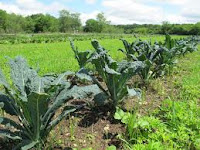 |
| photo via culinarytypes.blogspot.com |
It's winter and in many areas of the world--winter vegetables rule the dinner table. As well they should. Packed with nutrients and amazing flavors, it makes so much sense to eat what is in season in your area--fresh and available to you without adding to the carbon footprint (in this case fuel necessary to transport the food your way).
As a kid I remember eating kale as part of the notorious school lunch. It was canned. Even the thought of it now, so many years later, brings up that hideous tinny taste that had infiltrated the kale. So I grew up with a 'bad taste' in my mouth regarding kale. Fortunately I ate some fresh kale as an adult and I've loved it ever since--along with chard, beet tops, collard greens, spinach--i.e. all those amazing leafy greens.
Let's zoom in on kale for a minute. In an article on webmd.com kale is referred to as the 'queen of greens' and one of the healthiest vegetable on the planet. (Maybe that school I went to as a kid had a dynamite dietician who was in the know about kale--but canned?!) The article goes on to say that "choosing super-nutritious kale on a regular basis may provide significant health benefits, including cancer protection and lowered cholesterol." Now if that weren't enough (and it already is for me), here's what you get in one cup of glorious kale: 36 calories, 5 grams of fiber, and 15% of the daily requirement of calcium and vitamin B6, 40% of magnesium daily requirement, 180% of vitamin A, 200% of vitamin C, and 1,020% of vitamin K. It's also a good source of minerals copper, potassium, manganese, and phosphorus.
The article on webmd.com is worth reading in its entirety and I urge you to do so, because there is a wealth of other information, including that kale interferes in calcium absorption (so don't eat it at the same time you're eating calcium-rich foods like yogourt, for instance). According to a study in American Journal of Clinical Nutrition, cited in that webmd article, eating a diet rich in the powerful antioxidant K "can reduce the overall risk of developing or dying from cancer." (K is also found in parsley, spinach, collard greens, and animal products such as cheese, btw.)
Sold on kale? Check out this delightful recipe from Alice Currah's blog, which includes kale AND . . . tofu!:
Kale Mabu Tofu
What you need:
- 1 tablespoon vegetable oil
- 1 – inch piece ginger, peeled and minced
- 3 cloves garlic, minced
- 1/2 pound ground pork sausage
- 1/2 pound medium firm tofu, cut in 3/4-inches cubes
- 2 tablespoons oyster flavor sauce
- 1 tablespoon miso
- 1 tablespoon soy sauce
- 2 teaspoons Asian garlic chili sauce
- 1 cup chicken broth
- 4 cups baby kale leaves
- 2 tablespoons chopped scallions
How to make:
- Add the vegetable oil to a large skillet or wok and heat on medium-low heat.
- Add the ginger and garlic and sauté for about half a minute, just enough to soften the garlic and for it to be aromatic.
- Add the pork, breaking it down with a wooden spoon, and cook until brown.
- Increase the heat to medium-high and add the tofu.
- In a small bowl, mix the oyster sauce, miso, soy sauce, and garlic chili sauce until completely mixed.
- Add the sauce to the skillet. Stir the pork and tofu in the sauce and cook for 2 minutes, just enough time for the sauce to coat the sausage and absorb into the meat.
- Stir in the chicken broth.
- When the broth begins to bubble in a light simmer, add the kale leaves.
- Stir the kale in the mabu tofu until it is barely wilted.
- Transfer the mabu tofu and some broth over 2 or 3 brown rice bowls.
- Top off with additional garlic chili sauce for more heat.
- Garnish with scallions.
Sources:
http://savorysweetlife.com/2012/05/kale-mabo-tofu/
webmd.com









